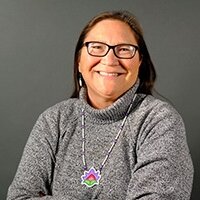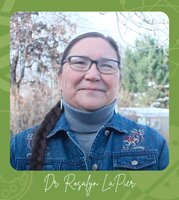Professor Rosalyn LaPier, an enrolled member of the Blackfeet Tribe of Montana and Métis, has joined the faculty of the Department of History at the University of Illinois, Urbana-Champaign in fall 2022. Her focus includes environmental history, the history of the American West, and Native American/Indigenous history. She is the prize-winning author of Invisible Reality: Storytellers, Storytakers and the Supernatural World of the Blackfeet, (University of Nebraska Press, 2017) which won both the 2018 John C. Ewers Book Award for the best book on the ethnohistory of North America and the 2018 Donald Fixico Award for the best book on American Indian and Canadian First Nations History. Her scholarship has appeared in leading journals in Western history and in important edited collections. Before her arrival at the U of I, she taught at the University of Montana. Professor LaPier holds a research appointment with the National Museum of Natural History, Smithsonian Institution.
LaPier has worked as an ethnobotanist and has collaborated on projects on sustainability and Indigenous ecological knowledge. She has also been part of a research team on the recovery of Native American languages that has been the recipient of a Luce Foundation grant.
Her current research and writing projects include “Plants That Purify” and “Protest as Pilgrimage,” which has been funded by American Council of Learned Societies’ Religion, Journalism & International Affairs Fellowship. LaPier’s second project in progress, “Protest as Pilgrimage,” is a multi-faceted examination of Indigenous women in environmental activism and the transformation of places of protest into sacred places of pilgrimage. Through the lenses of environmental justice, climate action, Indigenous activism, Indigenous knowledge and ways of knowing, and gender analysis, this work explores the connections and continuities between contemporary Indigenous protests – as places of Indigenous women’s religious revitalization – and historic female-focused religious practices.
LaPier is an environmental historian and an Indigenous scholar. She writes for public audiences and leads community-engaged research and instructional projects. She is the founder of Saokio Heritage, a community-based organization, created by Native women, interested in preserving the histories, languages, and traditional knowledge of Native peoples of the northern Great Plains. Her journalistic piece titled “The Legacy of Colonialism on Public Lands Created Mauna Kea,” received Honorable Mention for Best Editorial from the Native American Journalist Association. Dr. LaPier has also worked with the U.S. Environmental Protection Agency. Media outlets have interviewed her about Standing Rock, the March for Science, the Dakota Pipeline Protest, Environmental Racism in Montana, and Indigenous relationships with trees and rivers.
Please see some of her most recent work below.

